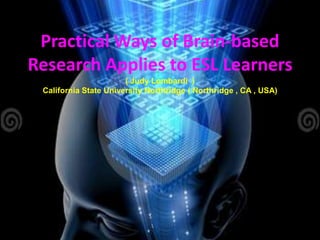Practical ways of brain based research applies to esl
•Transferir como PPTX, PDF•
1 gostou•1,080 visualizações
Denunciar
Compartilhar
Denunciar
Compartilhar

Recomendados
Mais conteúdo relacionado
Mais procurados
Mais procurados (20)
Semelhante a Practical ways of brain based research applies to esl
Semelhante a Practical ways of brain based research applies to esl (20)
INTRODUCTION TO TEACHER EDUCATION/ INSTRUCTIONAL TECHNIQUES

INTRODUCTION TO TEACHER EDUCATION/ INSTRUCTIONAL TECHNIQUES
Brain-Based Learning_ A Paradigm Shift in Education.pdf

Brain-Based Learning_ A Paradigm Shift in Education.pdf
Último
God is a creative God Gen 1:1. All that He created was “good”, could also be translated “beautiful”. God created man in His own image Gen 1:27. Maths helps us discover the beauty that God has created in His world and, in turn, create beautiful designs to serve and enrich the lives of others.
Explore beautiful and ugly buildings. Mathematics helps us create beautiful d...

Explore beautiful and ugly buildings. Mathematics helps us create beautiful d...christianmathematics
Último (20)
Web & Social Media Analytics Previous Year Question Paper.pdf

Web & Social Media Analytics Previous Year Question Paper.pdf
Explore beautiful and ugly buildings. Mathematics helps us create beautiful d...

Explore beautiful and ugly buildings. Mathematics helps us create beautiful d...
ICT Role in 21st Century Education & its Challenges.pptx

ICT Role in 21st Century Education & its Challenges.pptx
Mixin Classes in Odoo 17 How to Extend Models Using Mixin Classes

Mixin Classes in Odoo 17 How to Extend Models Using Mixin Classes
Unit-V; Pricing (Pharma Marketing Management).pptx

Unit-V; Pricing (Pharma Marketing Management).pptx
Measures of Central Tendency: Mean, Median and Mode

Measures of Central Tendency: Mean, Median and Mode
Unit-IV; Professional Sales Representative (PSR).pptx

Unit-IV; Professional Sales Representative (PSR).pptx
Practical ways of brain based research applies to esl
- 1. Practical Ways of Brain-based Research Applies to ESL Learners ( Judy Lombardi ) California State University Northridge ( Northridge , CA , USA)
- 2. Brain-based Learning Principle By :Renate Nummela Caine and Geoffrey Caine
- 3. Brain-Based This learning theory is based on the structure and function of the brain. is a concept that suggests that as long as the brain is not hindered from learning, then learning will occur.
- 4. Principle no. 1 The Brain is a Complex Adaptive system The brain can function on many levels and many ways simultaneously. A complex and Multifaceted task should be approach in variety of ways . Activity Shifting and teaching around the wheel of the learning style.
- 5. Andrew Cohen’s work at the University of Minnesota Rehearsal strategies constitute another subset of language use strategies, namely, strategies for rehearsing target language structures (such as form-focused practice) *example of rehearsal would be form-focused practice, for example, practicing the subjunctive forms for different verb conjugations Cover strategies are those strategies that learners use to create the impression that they have control over material when they do not. * example of a cover strategy would be using a memorized and not fully-understood phrase in an utterance in a classroom drill in order to keep the action going.
- 6. Principle no.2 The Brain is a Social Brain The Brain likes and respond well to social engagement and oral sharing. Cooperative learning.
- 7. Cooperative Learning Cooperative learning is a successful teaching strategy in which small teams, each with students of different levels of ability, use a variety of learning activities to improve their understanding of a subject. Each member of a team is responsible not only for learning what is taught but also for helping teammates learn, thus creating an atmosphere of achievement. Students work through the assignment until all group members successfully understand and complete it. Research has shown that cooperative learning techniques: promote student learning and academic achievement increase student retention enhance student satisfaction with their learning experience help students develop skills in oral communication develop students' social skills promote student self-esteem help to promote positive race relations
- 8. Principle no.3 The Search for Meaning Is Innate The brain not only wants to make sense of what it learns, but also wants to know that learning has purpose and value. Adlers believe “people learn things when they need to know them. The brain likes Explanation.
- 9. Principle no.4 The Search for Meaning Occurs Through Patterning When the brain encounters a new idea, it searches for prior knowledge and experiences similar to the new concept. when the brain encounter new idea it search for prior knowledge and experience similar to the new concept.
